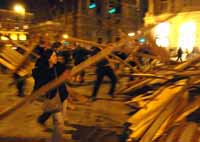Police use teargas, water cannon on Hungarian protesters
Hungarian police used water cannon and tear gas to repel around 1,000 skinheads and extremists in Budapest as anti-government protests marred celebrations of the country's 1848 revolution.

As night fell Thursday, rightwing protesters hurling cobblestones and bottles confronted hundreds of police in riot gear after authorities announced the detention of Gyorgy Budahazy, a man suspected of being a key figure in riots last year and who had been in hiding for months.
About 500-800 protesters tried to break through police lines to reach Budhazy, who was being held at the nearby National Investigations Office.
Police drove the protesters away from the national investigations office, where rioters initially gathered in the early evening, back into the capital's Heroes Square.
Rioters dismantled a wooden scaffolding, set up large makeshift roadblocks and lit bonfires in the street to prevent police from advancing. They also toppled several phonebooths.
By around 2100 GMT, police were able to disperse the rioters, with the last clashes taking place near several large international hotels on the banks of the River Danube.
A police spokesman said dozens of people had been detained and at least four police were injured.
Earlier, thousands of conservative protesters demanding the resignation of Socialist Prime Minister Ferenc Gyurcsany were present at events attended by the premier and other leading officials.
Gyurcsany's presence - outside parliament and at the National Museum - was met by jeering and whistling.
Some protesters carried Arpad striped flags, a centuries-old Hungarian banner now associated with the Arrow Cross, a pro-Nazi party that briefly ran Hungary near the end of World War II.
At a separate memorial event held later at March 15 Square, security personnel used large black umbrellas to shield Gyurcsany, Budapest Mayor Gabor Demszky and other authorities from coins, eggs and oranges thrown from the crowd.
"Nine out of 10 Hungarians are with us ... those who don't believe in the nightmare of two opposed Hungaries eternally at war," Demszky said, his voice often drowned out by the protesters' anti-government shouts and jeers.
Fidesz, the main center-right, opposition group, drew 200,000 supporters to its own late afternoon commemoration, according to state news agency MTI.
The crowd was much bigger than some expected considering government warnings about extremists plotting to disrupt Thursday's events with attacks against parliament and other prominent targets.
"We feel absolutely safe here," said Pal Tetlak, 70, who attended the rally. "The problem is that the political situation is hopeless."
Fidesz leader Viktor Orban, a former prime minister, said a planned referendum later this year would give voters a chance to reject some of the government's policies.
"We have to make clear that in a democracy, people have the right to send away the government ... if it does not respect their will," Orban told the crowd, blaming the "new aristocracy government" for the country's problems.
Orban also took a swipe at Gyurcsany's efforts to strengthen ties with Russia.
"Let's not forget that oil comes from the East, but freedom always comes from the West," Orban said, referring to the dependence of Hungary - like many other European countries - on Russian energy sources.
In the past months, the government has introduced higher taxes, direct payments for some health services, university tuition fees and has cut subsidies in an effort to lower the European Union's largest relative state budget gap.
Protests against Gyurcsany - including several violent riots - began in September, after the broadcast of a leaked recording in which he acknowledged his coalition lied about the economy to win re-election in April.
On Oct. 23 - the 50th anniversary of the 1956 anti-Soviet uprising - dozens of Fidesz supporters were injured when a daylong confrontation between a few thousand protesters and police - which moved along some 15 city blocks - reached a peaceful rally by Fidesz which drew 100,000 people, reports AP.
More than 120 commemorative events were scheduled in Budapest on Thursday, many of them also announced as protests against the government.
While Hungary's 1848 fight for independence ended in defeat a year later, it resulted in a 1867 compromise with the Habsburgs and the formation of the Austro-Hungarian Empire.
Subscribe to Pravda.Ru Telegram channel, Facebook, RSS!




